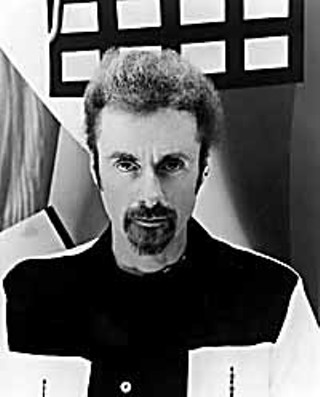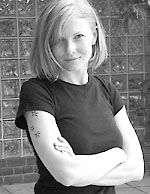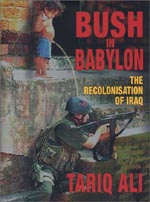World of Books
The Fifth Annual Texas Book Festival
By Roger Gathman, Fri., Nov. 10, 2000

T.C. Boyle
"I have a fascination with worst-case scenarios," says T.C. Boyle. He is dealing with one as we speak: Water has started leaking into his 109-year-old house as the first storm to hit Santa Barbara, Calif., in six months rages outside. So while he contemplates knotty lit-crit questions about why the themes of celebrity and catastrophe pop up so often in his work, he is also trying to perform a stopgap household repair. Water is gurgling in the background.Ironically, it is exactly the kind of problem which confronts Tyrone Tierwater, the hero of his newest novel, A Friend of the Earth. Set in the year 2025, the novel contemplates a world in which the worst climate change predictions have come true. Extreme storms alternate with extreme heat, ravaging a California which, back in the Nineties, Tierwater had tried to change with Earth First!-like activism. At 65, Tierwater, the veteran of several prison sentences, has given that all up in despair. As the biosphere seems to be spasming out, he's found refuge in taking care of rare but unloved species kept in a menagerie by a millionaire rock star. During the course of the novel, Tierwater remembers his youthful forays into activism, his jail sentences, and his grief after his daughter, Sierra, a tree-sitting protester, falls to her death from the redwood she is trying to save.
Tierwater is a transplanted New Yorker, and so interjects some needed irony into what could have been a very preachy mix. Boyle, too, comes from New York, and there's a saving, smart-aleck inflection in his voice, which definitely comes out in his books. If he is fascinated by environmental politics, which have figured heavily in his past couple of novels, he has never adopted the mellow, New Age-ish tone of the stereotypical Californian.
Boyle grew up in Peekskill, New York. Both his parents were alcoholics, and Boyle readily admits he is, too. That he is one potentially, rather than actually, he owes to writing. It is a way of "giving his life a center," opposing the easy pull of addiction. So far, he has produced eight novels and the numerous short stories which, in 1998, were published in his much-acclaimed Collected Short Stories. Another volume of short stories will be coming out next year.

Boyle started out as a musician. He played the saxophone, and even now plays occasionally with a band named the Ventilators. "You can go to my site [www.tcboyle.com] and download a version of me singing that Screaming Jay Hawkins song, 'I Put a Spell on You.' Unfortunately, I don't make much music anymore. Ever since publishers decided it was a good idea to drag authors out to every bookstore in every mall in Middle America, I am either travelling or writing. I had to make a decision to give my contemplative time to writing."
Boyle spent two years after college hanging out with a druggy set. He's been thinking about that time lately, since his next novel is going to be set back in the "hippie days," questioning what it meant. "The culture at the time seemed to encourage spontaneity. I thought it was cool at the time, but now I'm trying to answer the question, what is the value of hip? For a while it meant tearing down the values of the preceding generation, but what values did we create, really? I've been watching the World Series on TV, and from the advertisements it looks like we are right back in the Yuppie era. Unapologetic consumerism and the great American desire to gamble, which is of course satisfied by the stock market."
Boyle gave up music for writing while in college, and after his time in the drug scene got himself into the Iowa Writers' Workshop. Immediately upon graduating, he was recruited by the University of Southern California in L.A. to teach in the creative writing program, and has lived in California for the last 23 years. Not bad for a kid who had never been west of New Jersey until he was 21.
Unlike some writers of serious fiction, Boyle is now lucky enough not to have to teach. His own celebrity status emerged from the coterie reputation he had made with his earlier stories and novels when, in 1987, he published World's End. The novel evoked flattering comparisons with Gabriel García Márquez and earned Boyle an interview in Rolling Stone magazine. Something in Boyle does respond to fame. Although he views his fiction as "deeply serious," he also admits to wanting celebrity. "Celebrity isn't the goal," he says, "since who the writer is doesn't matter. On the other hand, the audience desperately wants to know more about the author -- about where the writing came from. I can understand that. With books I like, I want to know more about the author."
Some have criticized Boyle for a lurking cruelty which they claim to find in his work. Boyle discerns more than a little hypocrisy in that complaint. "We love to read about desperate straits. We revel in the suffering of others. What do Time and Newsweek give us every week but a pornography of death, a continuous series of stories about suffering somewhere in the world?"
Given this jaundiced view of the human condition to which one of the writers Boyle most admires, Evelyn Waugh, would no doubt subscribe, Boyle approaches his environmental topics with a keen eye for the discrepancy between the idealism and the hidden premises of the most radical nature writers. "Nature writers have a misanthropic streak. They don't seem to like people. And that's not illogical, if six billion people are destroying the earth. We are, after all, the illness, and logically if there are less of us, that is the cure. So this brings up a deep question: What is the value of human life? I have a misanthropic streak myself. I'm writing about this partly to challenge that tendency in myself."
T.C. Boyle will read from A Friend of the Earth on Sunday, Nov. 12, at 12:15pm in the Senate Chamber.








